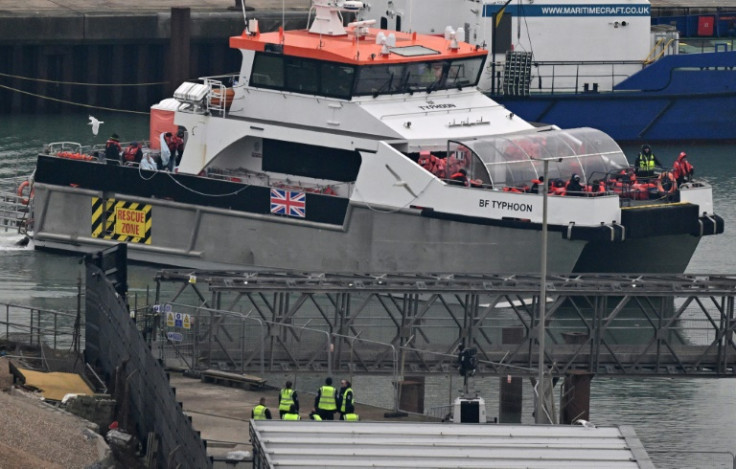UK's Sunak Battles Rebels Over Rwanda Migrant Law
UK leader Rishi Sunak fought to quell growing dissent within his ruling party Tuesday over his plan to send migrants to Rwanda, testing his authority with a general election on the horizon.

UK leader Rishi Sunak fought to quell growing dissent within his ruling party Tuesday over his plan to send migrants to Rwanda, testing his authority with a general election on the horizon.
Two deputy chairmen of the Conservatives resigned their roles as they joined dozens of Tory right-wingers in backing amendments to toughen the scheme, seen as key to Sunak's pledge to cut immigration.
The Conservative prime minister has staked his political future on slashing record levels of regular migration and stopping asylum seekers crossing from France to Britain in small boats.
The Safety of Rwanda (Asylum and Immigration) Bill is at the heart of that promise, as Sunak's answer to a unanimous UK Supreme Court ruling in November that deporting asylum seekers to Rwanda is illegal under international law.

If passed, it would compel judges to treat Rwanda as a safe third country and proposes giving UK ministers powers to disregard sections of international and British human rights legislation.
The United Nations High Commissioner for Refugees (UNHCR) says the bill and a recently signed treaty with Kigali designating Rwanda "safe" were "not compatible" with international refugee law.
The proposal has reopened schisms between right-wing and centrist Tory MPs in infighting not seen since the wranglings over Brexit, leaving Sunak between a rock and a hard place as he fights to turn it into law.
A total of 58 Tory lawmakers backed an amendment that aimed to prevent international law from being used to block or delay a person from being deported to Rwanda.
Dozens also supported a separate amendment that sought to restrict asylum seekers' rights to appeal against deportation.
Ex-prime minister Boris Johnson, who introduced the Rwanda scheme when he was in office, also backed the amendments, though he is no longer an MP so was not able to vote.
The amendments failed to pass but suggest that Sunak is at risk of losing a main vote on his bill expected on Wednesday night.

Party rebels had threatened to kill the Rwanda legislation during the first vote on the issue last month but Sunak faced them down and won a knife-edge parliamentary vote.
If Sunak bows to the rebels' demands, the bill would almost certainly be scuppered by moderates, who oppose violating international law and say the legislation already pushes the limits.
The rebels may ultimately decide it is better to back their leader rather then side with the main opposition Labour party, which calls the plan a "gimmick".
Tory MPs Lee Anderson and Brendan Clarke-Smith said they were stepping down as deputy chairs for defying their party on the amendments but suggested they might ultimately still vote for the bill.
"We both look forward to making this legislation work," they wrote in a joint letter to Sunak.
In a bid to appease MPs who fear that individual appeals against deportation to Rwanda could clog the courts, Sunak's government announced Tuesday that it would hire new judges to fast-track cases.
Justice Secretary Alex Chalk said the changes would create 5,000 additional sitting days to hear appeals.
A spokesman for Sunak said the move showed that the government was "taking every conceivable step to ensure" that flights to Kigali could take off.
He added that discussions with lawmakers were "still ongoing".
The wranglings are testing the leadership mettle of Sunak -- in power since October 2022 -- as Britain heads towards a general election.
The prime minister has yet to announce the date for the nationwide vote but has said it will be held this year.
Some opinion polls put Labour more than 20 points ahead of the Tories, suggesting the governing party is heading for a landslide defeat.
Sunak says the Rwanda bill is essential to deter migrants from considering travelling to the UK via unauthorised routes, and accuses Labour of having no plan to "stop the boats".
Around 30,000 asylum seekers crossed the English Channel on rudimentary vessels last year. Five died trying to make the journey this past weekend.
© Copyright AFP 2025. All rights reserved.





















